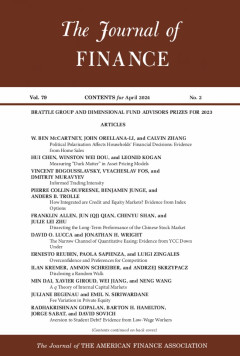Ditapis dengan

Feedback Effects and Systematic Risk Exposures
We model the “feedback effect” of a firm's stock price on investment in projects exposed to a systematic risk factor, like climate risk. The stock price reflects information about both the project's cash flows and its discount rate. A cash-flow-maximizing manager treats discount rate fluctuations as “noise,” but a price-maximizing manager interprets such variation as information about t…
- Edisi
- Vol. 80 Issue 2, Apr 2025
- ISBN/ISSN
- 1540-6261
- Deskripsi Fisik
- 1327 p.
- Judul Seri
- The Journal of Finance
- No. Panggil
- -

Choosing to Disagree : Endogenous Dismissiveness and Overconfidence in Financ…
The psychology literature documents that individuals derive current utility from their beliefs about future events. We show that, as a result, investors in financial markets choose to disagree about both private information and price information. When objective price informativeness is low, each investor dismisses the private signals of others and ignores price information. In contrast, when pr…
- Edisi
- Volume 79, Issue 2, April 2024, Pages 1635-1695
- ISBN/ISSN
- 1540-6261
- Deskripsi Fisik
- ill, chart, table, grafik, 924 hal, 20 cm
- Judul Seri
- -
- No. Panggil
- -

Disclosing to Informed Traders
We develop a model in which a firm's manager can voluntarily disclose to privately informed investors. In equilibrium, the manager only discloses sufficiently favorable news. If the manager is known to be informed but disclosure is costly, the probability of disclosure increases with market liquidity and the stock trades at a discount relative to expected cash flows. However, when investors are…
- Edisi
- Volume 79, Issue 2, April 2024, Pages 1513-1578
- ISBN/ISSN
- 1540-6261
- Deskripsi Fisik
- ill, chart, table, grafik, 924 hal, 20 cm
- Judul Seri
- -
- No. Panggil
- -

The cost of short-selling liquid securities
Standard models of liquidity argue that the higher price for a liquid security reflects the future benefits that long investors expect to receive. We show that short-sellers can also pay a net liquidity premium if their cost to borrow the security is higher than the price premium they collect from selling it. We provide a model-free decomposition of the price premium for liquid securities into …
- Edisi
- -
- ISBN/ISSN
- 221082
- Deskripsi Fisik
- -
- Judul Seri
- -
- No. Panggil
- JOF6802
 Karya Umum
Karya Umum  Filsafat
Filsafat  Agama
Agama  Ilmu-ilmu Sosial
Ilmu-ilmu Sosial  Bahasa
Bahasa  Ilmu-ilmu Murni
Ilmu-ilmu Murni  Ilmu-ilmu Terapan
Ilmu-ilmu Terapan  Kesenian, Hiburan, dan Olahraga
Kesenian, Hiburan, dan Olahraga  Kesusastraan
Kesusastraan  Geografi dan Sejarah
Geografi dan Sejarah